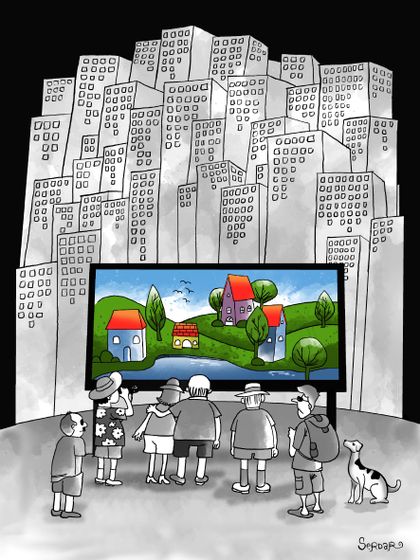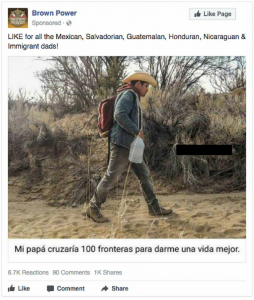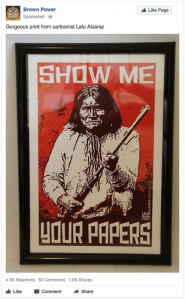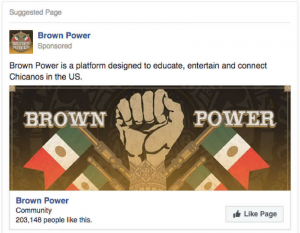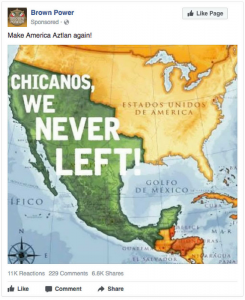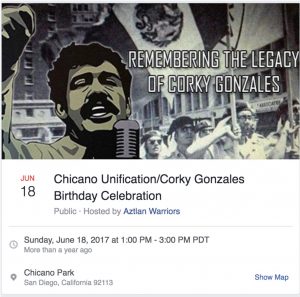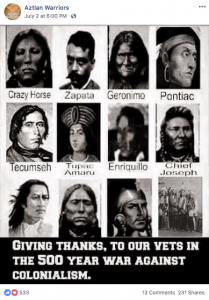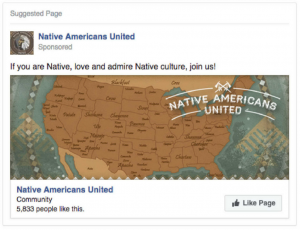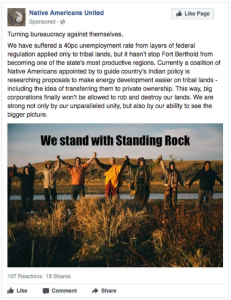PART THREE of THREE
Social Media Woketivism Is A Representation Of Political Culture, Not The Real Thing
A significant number of social media-centric raza activists, including MEChistas, have embraced a tendency that privileges individual identities over collective expressions of political struggle and political power. This tendency appears within forms of neoliberal performative politics sometimes referred to as “call-out culture,” “clicktivism,” “virtue signaling,” or “woketivism.” It is prevalent within liberal networks aligned with the Democratic Party, college administrators and academicians, a growing number of campus-based student resource centers designed to de-radicalize working class students, employees from the 501c3 non-profit industrial complex, and social media “influencers” who are primarily committed to expanding their online profiles.
Social media technologies make it increasingly easy to forget that everything digital is only a representation of something else – online content might represent something real happening in the real world among real people, or it is just as likely to be a representation of something totally fake, contrived, staged, and/or manipulated. In the world of online “woke” politics, knowing the difference between the real and the fake is almost impossible. Intentionally or not, activism that is dependent on social media – woketivism – sets up an equivalency between political struggle/political power and social media consumption by centering individual digital “clicks, views, retweets, likes, follows, and shares” as the most important measure of impact and political success. Correspondingly, “woke” political culture diminishes the importance of human forms of political struggle in the real, natural world.
There is no such thing as a “virtual/ digital/ online” revolution – the revolution will not be digitized. Consequently, no online representation of leftist political struggle should ever be taken seriously unless it provides evidence that it is backed up by real organized struggle on the ground with real people, and is accountable to real working class communities. This is a “bottom line” argument we are making, and it should be understood as a general disqualification of all woketivists – individual and institutional – who seek to intervene in some of the most urgent political debates of our time, while at the same time proving to be unwilling and/or incapable of prioritizing work that engages real working class communities to combat trumpista fascist violence, including state-sponsored terror (ICE raids, family separations, military deployed to the border, etc), acts/threats of white nationalist violence, dehumanizing political discourse from all levels of government, imminent U.S. invasions across Nuestra América, intensified exploitation of our labor, environmental degradation, etc. This is not just an ideological argument we are making here – it is an urgently practical argument as well.
The Enemy We Know, And The Enemy We Don’t
On May 10, 2018, Democrats serving on the U.S. House of Representatives Permanent Select Committee on Intelligence released 3,519 Facebook advertisements to the public, claiming that these ads were a sample of 80,000 “pieces of organic content” created by a “Russian ‘troll’ farm” identified as the Internet Research Agency (IRA) headquartered in Saint Petersburg, Russia. The May 2018 report did not measure the political impact of the 3,519 Facebook advertisements, but it did suggest that they intended “…to influence the 2016 election and exploit and attempt to worsen America’s polarized political climate in the months that followed…” and that 126-140 million people in the U.S. were exposed to these fake ads between 2015 and 2017. Subsequent reports related to this investigation referred to the creation of fake Twitter and Google accounts, as well as a grand jury indictment issued against thirteen Russian nationals and three Russian companies for conspiring to interfere in the 2016 U.S. presidential elections. These Facebook advertisements were also linked to the Cambridge Analytica scandal, the 2016 hacking of the DNC servers, and other topics at the center of the recently released Mueller report.
Digital hacking, meddling, surveilling, and trolling have become common methods of behavior modification within U.S. and international forms of political communication and imperialist interventions. What is historically significant and of specific interest to movimiento forces is a small subset of precise advertisements we found within the 3,519 ads allegedly created by the Russia-linked IRA.
These Are Only 6 Of The 205 Raza-Oriented Ads That Directly Relate To The Movimiento. To See More Of These Ads Click Here.
These advertisements are six of the 205 Facebook ads shared by the Permanent Select Committee on Intelligence that came from a “community” page titled Brown Power. In early 2017, the Brown Power Facebook account had at least 203,148 followers, and its ads targeted people who had demonstrated interest in “Mexico; Latin hip hop; Chicano Movement; Hispanidad; Lowrider; Chicano rap; La Raza…”.
Twenty-one of the Facebook Ads found in this sampling were created by another “community” account titled Native Americans United. This account had at least 5,800 followers, and targeted ads to people who had demonstrated interest in “Standing Rock Indian Reservation; Native American Times; American Indian Movement; Native American civil rights; Indian Country Today Media Network; Native Peoples Magazine; National Congress of American Indians; Native News Online…”.
In July of 2018 Facebook announced the closure of 32 additional Facebook and Instagram accounts allegedly linked to the Russian IRA “troll farm.” Among them was a Facebook account titled Aztlan Warriors that potentially had over 290,000 followers. Ironically, Aztlan Warriors was noted as being based in San Diego, California (the city where Unión del Barrio was founded), and during the summer of 2017 people associated with Aztlan Warriors went so far as to announce via Facebook that they were hosting an event in Chicano Park to commemorate the birthday of Corky Gonzáles.
These 226 raza-oriented ads represented less than 7% of the total that were released to the public in May of 2018. Well over half of the Facebook ads (1,968 – 56%) in the sample came from so-called “Black Identity” accounts such as Black Excellence, Blacktivist, and Woke Blacks. 770 ads (22%) came from right-wing “White Identity” accounts; 143 ads (4%) from liberal “White Identity” accounts; and 101 ads (3%) from “Muslim Identity” accounts. There were also numerous generic accounts related to random memes and gaming. Furthermore, this sampling is drawn from at least “80,000 pieces of organic content created by those pages,” meaning there were tens of thousands more posts similar to these that have not been released to the public. Finally, it is extremely likely that there are more false raza-oriented accounts that continue to be active today.
As much as it is needed, providing more insight about these accounts, the 2016 Trump campaign, the Mueller investigation, and the intensifying crisis and divisions within the U.S. ruling class goes beyond the focus of this analysis, and can’t be fully addressed here. Suffice to say that Unión del Barrio will never accept at face value anything the U.S. government or its intelligence agencies say about international meddling in elections, or about any other topic for that matter. We do confirm that we don’t know who managed any of these fake social media accounts, we have not heard of anyone claiming ownership of them, and we did not hear any sustained complaints within movimiento circles about Facebook and the U.S. government shutting them down. We don’t know if these ads were actually created by the Russian government, or the CIA, or some other agency interested in influencing “Chicano” politics (electoral or otherwise) within the U.S. by creating false social media accounts. In hindsight it is clear that these ads represent a small sample of what was likely a broad malicious social media campaign intended to influence movimiento publics by weaponizing a form of social media woketivism.
Clearly, some of the content in these ads was pilfered from real social media accounts, but nearly all of this material appears to have been created by people who had a strong understanding of a particular sector of our population. This case demonstrates how the content of malicious social media woketivism does not matter – even the most innocuous meme can be a part of a broader effort to hijack or derail political movements. Politically conscious people should not elevate social media dependent forms of political identity and representation to anything more than entertainment. Furthermore, if we hope to recover political autonomy and self-determine the content and direction of our movimiento, then we must recognize that social media dependent activism must not be considered a viable form of conducting political struggle. Consumption/distribution of political information online must not be confused with political struggle.
The key lesson we must take away from this merits repeating: no online representation of leftist political struggle should ever be taken seriously unless it provides evidence that it is backed up by real organized struggle on the ground with real people, and is accountable to real working class communities.
Woketivism Is A Tecno-Capitalist Disorder Of Political Culture
The only real liberation struggle is that which takes place between real people, in real life, in the real world to overturn a material relationship between the oppressed and the oppressor. The techno-utopian promise that social media is, of and within itself, a liberating technology is dead. As leftists and revolutionaries (not woketivists) we must keep in mind that all digital communication technologies are designed, at the algorithmic level, to accelerate consumption, reinforce the existing power relations, and reproduce the basic values of neoliberal capitalism.
It does not matter that digital communication technologies might sometimes be used to share authentic information about people’s struggles, they are still market-based instruments of neoliberal capitalism designed for behavior modification. Malicious/fake social media woketivism is a threat precisely because it takes advantage of weaknesses that are inherent to non-malicious/real woketivism. One of these inherent weaknesses is that real social media woketivists suffer a generational alienation from their own communities that is at least partially rooted in how young activists first became politically conscious (what is now referred to as “woke”). Whereas previous generations might have entered into autonomous political life by engaging in political struggle through debate, reading books, attending meetings, and/or organizing protests in the real, social world – what used to be called “concientización” in our barrios, the current generation of young raza activists are more likely to have achieved “wokeness” via social media, sometimes years before participating in any real world political action.
Most young people today have been exposed to digital communication technologies from a very young age, and have a deeper relationship to social media than people who have only used social media as adults. Some youth learned to navigate mobile phones and tablets before they even learned to speak. Digital communication technologies play a more central role in the lives of young people, for learning and development, consumption preferences, assimilating cultural norms, and identity formation. In the absence of competing forms of identity formation, it should be no surprise that digital communication technologies serve as the primary space of political struggle for the young raza woketivist, who finds acceptance, validation, and collective solidarity via individual “clicks, views, retweets, likes, follows, and shares”.
This is something we might call the neoliberal inversion of political struggle – the privileging of individual identities and emotional needs as a primary principle of political unity (as opposed to a practical necessity). Online woketivism becomes a way to demonstrate how open minded, intersectional, inclusive, and “woke” an individual activist can be relative to the digital world they help create, even to the point of becoming alienated from the real world their families and communities still inhabit. This type of alienation insists that political collectives privilege the needs of the individual woketivist, and not the reverse that presumes individual activists will identify with, find acceptance within, and be accountable to existing collectives rooted in their own communities.
The arguments currently circulating online in defense of the MEChA name change illustrate this point. Supporters of the name change enter into political struggle with critical assessments of everything and everyone else because it is all colonial and/or problematic. Nothing in the real world lives up to the social media woketivist standard of inclusivity. Woketivism is hostile to history and/or “elders”, disdainful of collective identities (national, ethnic, linguistic, movimiento), and generally disconnected from mass based, community-centered organizing. The limited attendance at the 2019 National MEChA Conference and claims of declining MEChA membership attributed to “Mexican hegemony” might actually be indicative of an over-reliance on social media outreach and online “organizing,” versus more direct contact between MEChA chapters and off-campus raza communities across the U.S.
Social media woketivism is often elitist, and is generally corrosive to working class unity. This inversion of community struggle is not overtly ideological, but it is quite dependent on neoliberal individualism within political culture, and is more aligned to the reactionary individualism of Ayn Rand and pro-capitalist libertarianism, versus a position rooted in social justice, collective working class people’s power, and socialism. The inversion of community struggle motivates the increasing “meme-ification” of left-wing online political debate (this happens with right-wing online political debate as well, although the right-wing process more often leads young people become violent reactionaries and even domestic terrorists).
Consequently, we need to find ways to inoculate the movimiento from the negative influences of woketivism. Our communities will be better off maintaining a healthy cynicism of all social media content, and learning how to critically assess the sources and ideological orientation of digital political content. Non-malicious social media woketivists, “influencers,” and online “news and culture” content producers should also be reminded to stay in their own lane by respecting the political leadership of movimiento organizations.
If we demand more social media content for our movement because we think we can use it to build strong communities, we will inevitably fail. On the other hand, when we serve the interests of our communities, then we should use social media as an instrument that we control, and not the other way around. Political action should leverage social media as an instrument through which local struggles can be reinforced and expanded, spread to other communities that are suffering the same attacks, or shared with people who are in solidarity with the struggle. The essential root of political power is people’s power – the power to physically defend a community, and only viable community-based organizations can engage with people’s power.
The point of this analysis is to argue that there is NO social media solution to the problems of our communities. Liberation struggle is a social process that must be anchored to political action that is taking place in the real world, and there is no shortcut to building strong and politically independent community-based organizations.
This analysis is the third of three parts of Unión del Barrio’s Report & Analysis On The 2019 MEChA National Conference.
PART ONE: Our Report On The 2019 MEChA National Conference
PART TWO: We Disagree With The Decision To Change What M.E.Ch.A. Stands For
PART THREE: Social Media Woketivism Is A Representation Of Political Culture, Not The Real Thing






